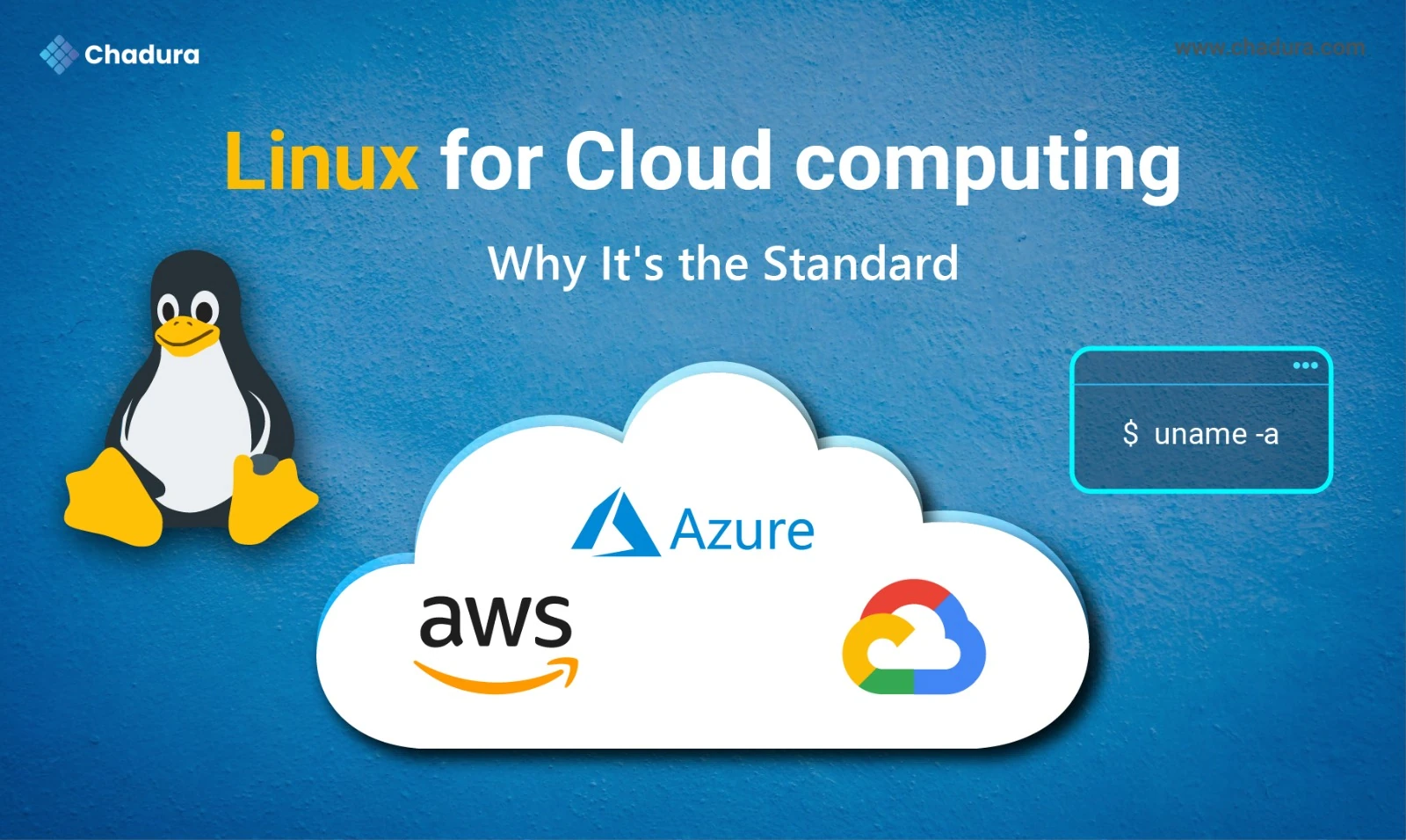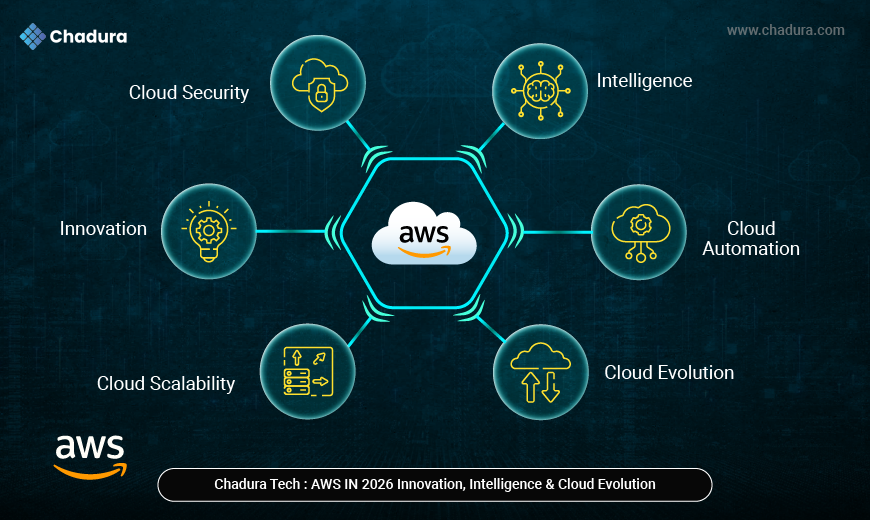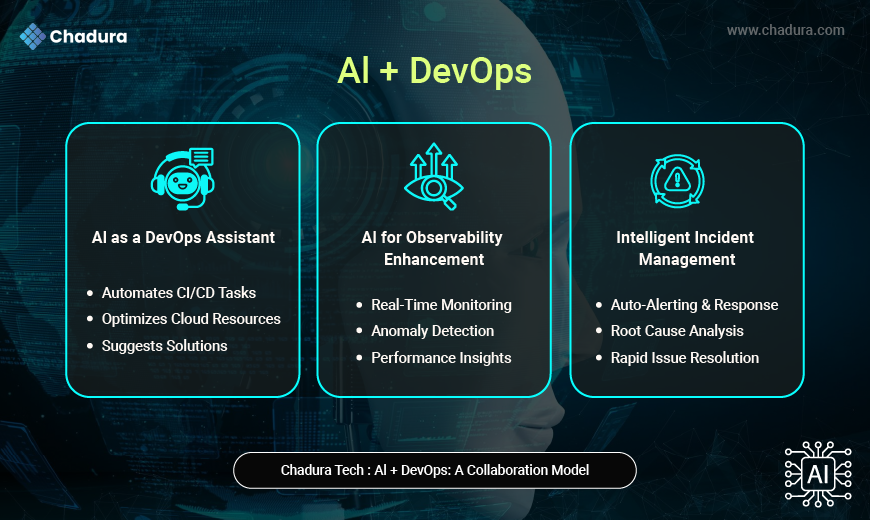Why Linux Leads the Cloud Revolution | A Chadura Tech Perspective
Cloud computing has revolutionized how businesses deploy, scale, and manage applications. From startups to global enterprises, the cloud offers agility, cost-efficiency, and innovation at scale. But behind this transformation lies a powerful, flexible, and open-source operating system—Linux.
Linux is the backbone of modern cloud infrastructure. It powers virtual machines, containers, orchestration platforms, and edge devices. Whether you're using AWS, Azure, GCP, or building your own private cloud, chances are Linux is running under the hood.
In this blog, we’ll explore why Linux is the standard for cloud computing, covering its architecture, advantages, use cases, and future in the cloud-native era.
What Is Linux?
Linux is a Unix-like operating system created by Linus Torvalds in 1991. It’s open source, meaning anyone can view, modify, and distribute its code. Over the years, Linux has evolved into a robust platform used in servers, desktops, mobile devices, embedded systems, and—most notably—cloud environments.
Key features of Linux include:
- Modularity: Lightweight and customizable
- Security: Granular permissions and kernel hardening
- Stability: Proven reliability under heavy workloads
- Community: Thousands of contributors and active forums
What Is Cloud Computing?
Cloud computing delivers computing services—servers, storage, databases, networking, software—over the internet. It eliminates the need for physical infrastructure and enables on-demand scalability.
Cloud Models:
- IaaS (Infrastructure as a Service): Virtual machines, storage, networking
- PaaS (Platform as a Service): Development platforms and tools
- SaaS (Software as a Service): Applications delivered via browser
Deployment Types:
Deployment involves transferring software from a local or test environment to a live server or cloud platform. It includes:
- Packaging the application
- Configuring environments
- Installing dependencies
- Starting services or containers
- Monitoring performance and errors
Deployment Types:
- Public Cloud: Shared infrastructure (e.g., AWS, Azure)
- Private Cloud: Dedicated infrastructure for one organization
- Hybrid Cloud: Combination of public and private
- Multicloud: Using multiple cloud providers
Why Linux Dominates the Cloud
1. Open Source Freedom
Linux’s open-source nature allows cloud providers and enterprises to customize the OS, avoid vendor lock-in, and reduce licensing costs.
2. Scalability and Performance
Linux handles high-performance workloads efficiently. Its kernel is optimized for multi-core processors, virtualization, and containerization.
3. Security and Isolation
Linux supports advanced security features like SELinux, AppArmor, namespaces, and cgroups—essential for multi-tenant cloud environments.
4. Containerization and DevOps
Linux is the foundation for:
- Docker: Containers run natively on Linux
- Kubernetes: Orchestrates Linux-based containers
- CI/CD tools: Jenkins, GitLab, Ansible—all built for Linux
5. Cloud Provider Support
All major cloud platforms offer Linux-based instances:
A cloud provider is a company that delivers computing services—such as servers, storage, databases, networking, software, and analytics—over the internet. These services allow individuals and organizations to access powerful infrastructure and platforms without owning physical hardware.
Key Features of Cloud Providers
- On-Demand Access: Resources can be provisioned instantly and scaled as needed.
- Pay-as-You-Go Pricing: Users pay only for what they use, reducing upfront costs.
- Global Availability: Data centers across regions ensure high availability and low latency.
- Security & Compliance: Built-in tools for encryption, identity management, and regulatory compliance.
- Innovation Tools: Access to AI, machine learning, big data, and serverless computing.
Cloud Provider Support
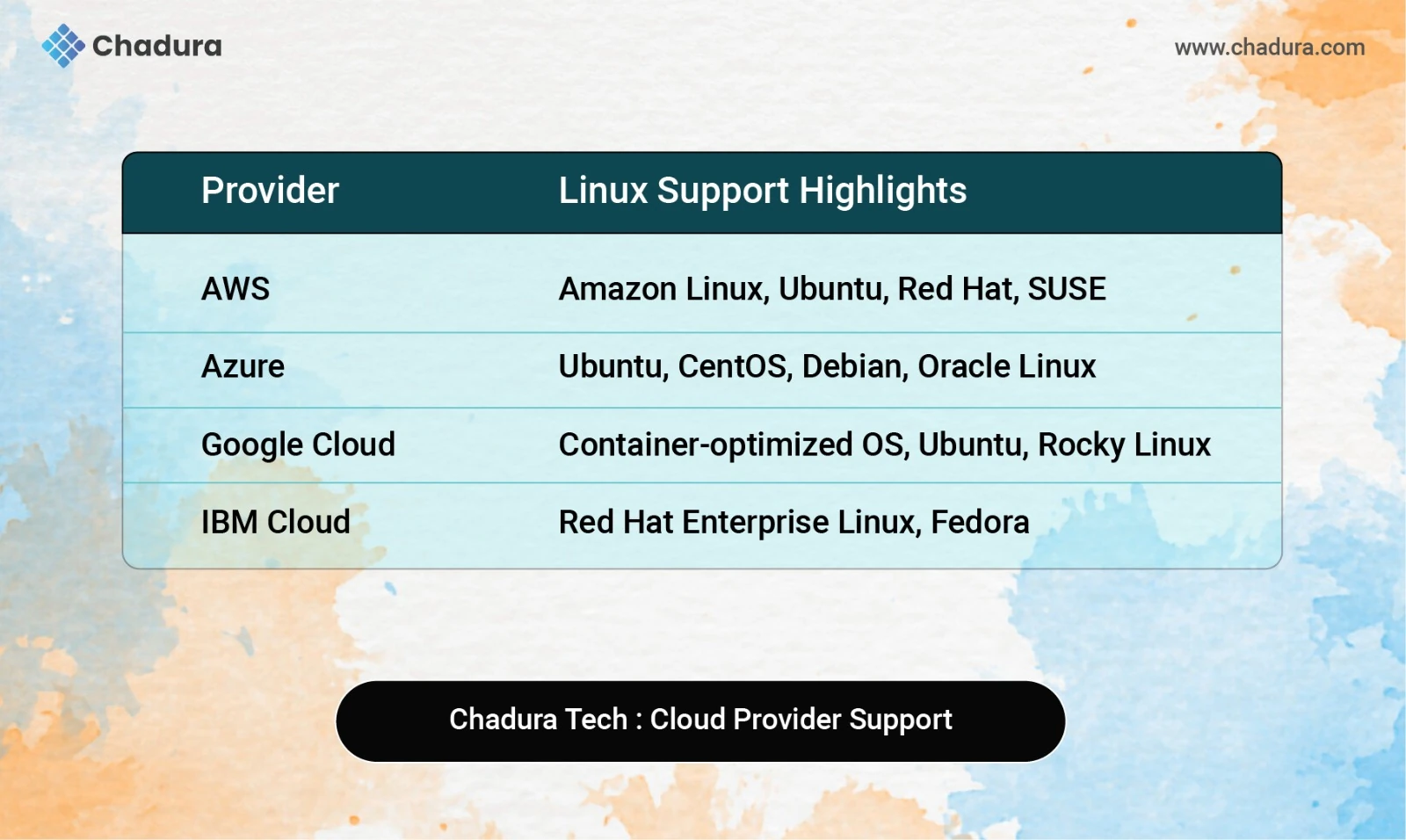
Popular Linux Distributions for Cloud
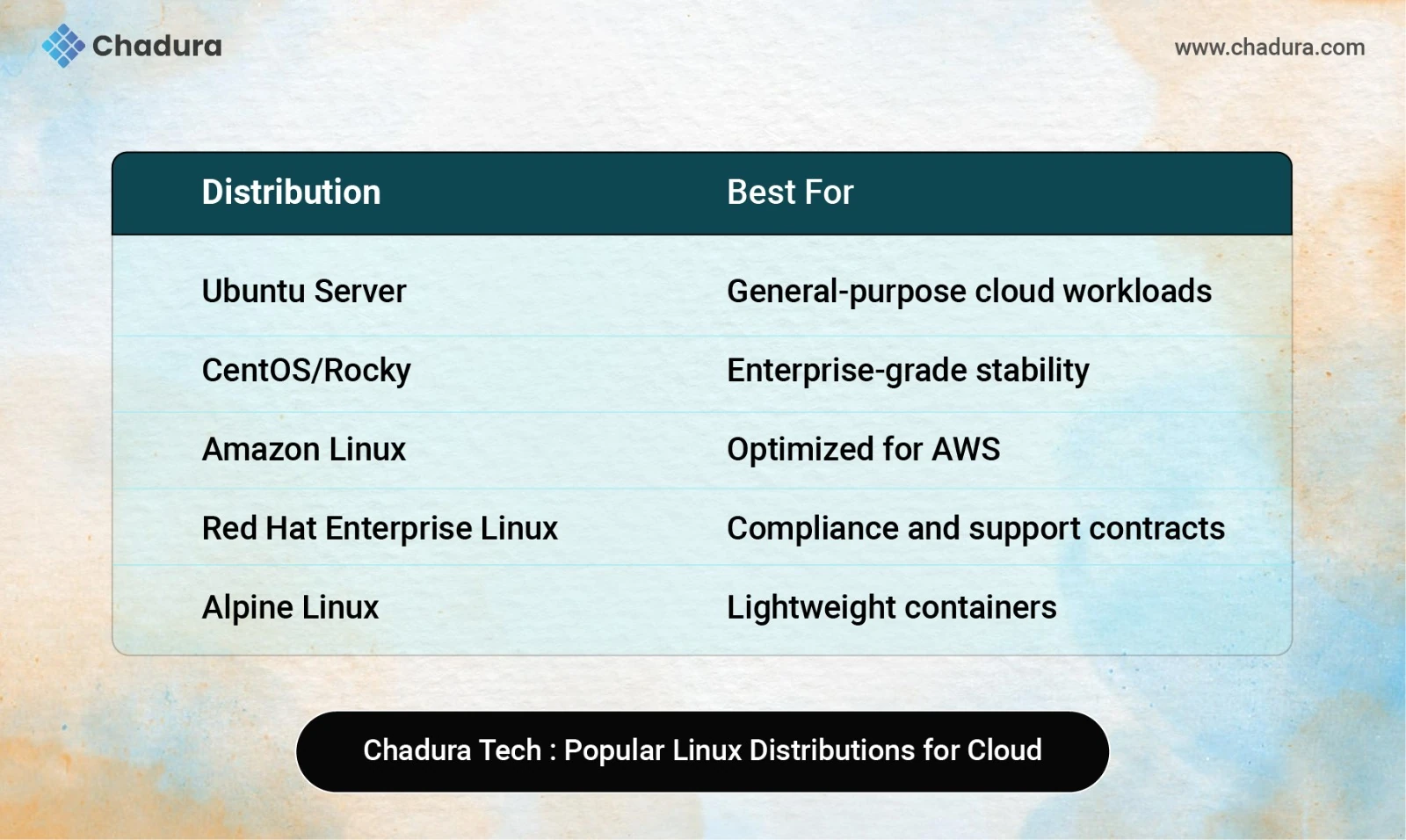
Real-World Applications
Linux powers:
- Web servers: Apache, NGINX, Node.js
- Databases: MySQL, PostgreSQL, MongoDB
- CI/CD pipelines: Jenkins, GitLab CI
- Cloud-native apps: Microservices, serverless functions
- Edge computing: IoT devices, gateways, and sensors
Security in Linux Cloud Environments
Linux provides enterprise-grade security:
SELinux/AppArmor:
- SELinux (Security-Enhanced Linux) and AppArmor are kernel-level security modules that enforce Mandatory Access Control (MAC) policies. Unlike traditional discretionary access controls, MAC restricts even root-level processes based on predefined rules.
- Mandatory access control
- SELinux: Developed by the NSA, it uses security contexts and policies to tightly control access between users, processes, and files.
- AppArmor: Uses profile-based rules to confine applications, making it easier to manage and audit than SELinux.
- Firewall tools: iptables, nftables, ufw
Linux offers powerful firewall utilities to manage inbound and outbound traffic:
- iptables: Legacy tool using chains and rules to filter packets. Still widely used but being phased out.
- nftables: Modern replacement for iptables, offering better performance and unified syntax.
- ufw (Uncomplicated Firewall): A user-friendly frontend for iptables, ideal for quick setup on Ubuntu and Debian systems.
- Encryption: LUKS, GPG, TLS
Encryption ensures data confidentiality both at rest and in transit:
- LUKS (Linux Unified Key Setup): Full-disk encryption for block devices, commonly used in laptops and servers.
- GPG (GNU Privacy Guard): Encrypts files, emails, and messages using public-key cryptography.
- TLS (Transport Layer Security): Secures data in transit over networks—used in HTTPS, VPNs, and APIs.
- Audit tools: auditd, logrotate, fail2ban
Audit tools help track system activity, detect anomalies, and maintain logs for forensic analysis:
- auditd: The Linux Audit Daemon logs system events like file access, user actions, and policy violations.
- logrotate: Manages log file rotation, compression, and archival to prevent disk overuse.
- fail2ban: Monitors logs for suspicious login attempts and blocks offending IPs automatically.
These tools help maintain compliance and protect sensitive data in cloud deployments
Linux and Automation
Automation is key to cloud efficiency. Linux supports:
- Shell scripting: Automate tasks with Bash
- Cron jobs: Schedule recurring jobs
- Infrastructure as Code: Use Ansible, Terraform, Puppet
- Monitoring: Prometheus, Grafana, Nagios
These tools integrate seamlessly with Linux, enabling DevOps workflows and rapid deployment.
Learning Linux for Cloud
To master Linux for cloud computing, explore:
- Linux Foundation Training
- Cloud Academy Linux Courses
- AWS and Azure Linux Tutorials
- [Chadura Tech Blog Series]
The Future of Linux in the Cloud
Linux continues to evolve with cloud-native technologies:
- Kubernetes: Built on Linux containers
- Serverless: Lightweight Linux runtimes
- Edge computing: Linux on IoT and remote devices
- AI/ML workloads: Linux-optimized frameworks
With its flexibility, security, and community-driven innovation, Linux will remain the foundation of cloud computing for years to come
Final Thoughts
Linux isn’t just an operating system—it’s the engine of the cloud. Its open-source nature, scalability, and compatibility make it the default choice for cloud computing across industries.
At Chadura Tech, we believe Linux is the key to unlocking cloud-native innovation. Whether you're deploying your first VM or orchestrating containers at scale, Linux gives you the control, performance, and freedom to build the future.


